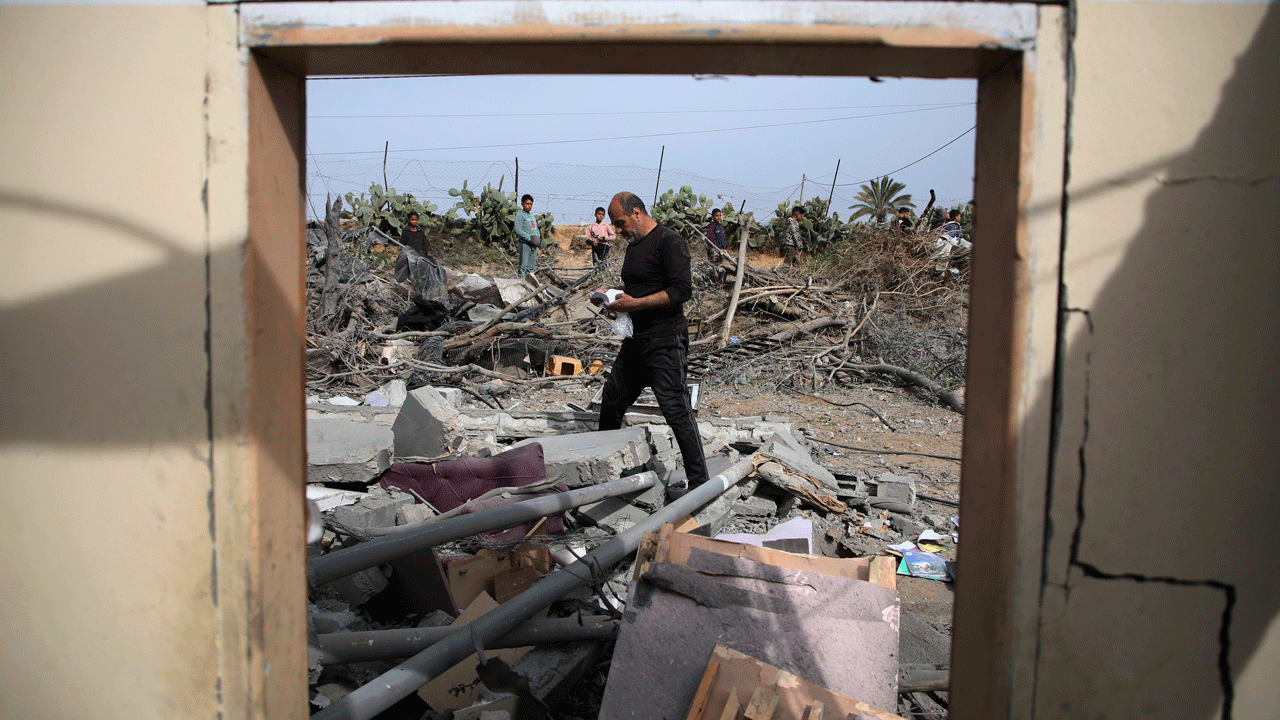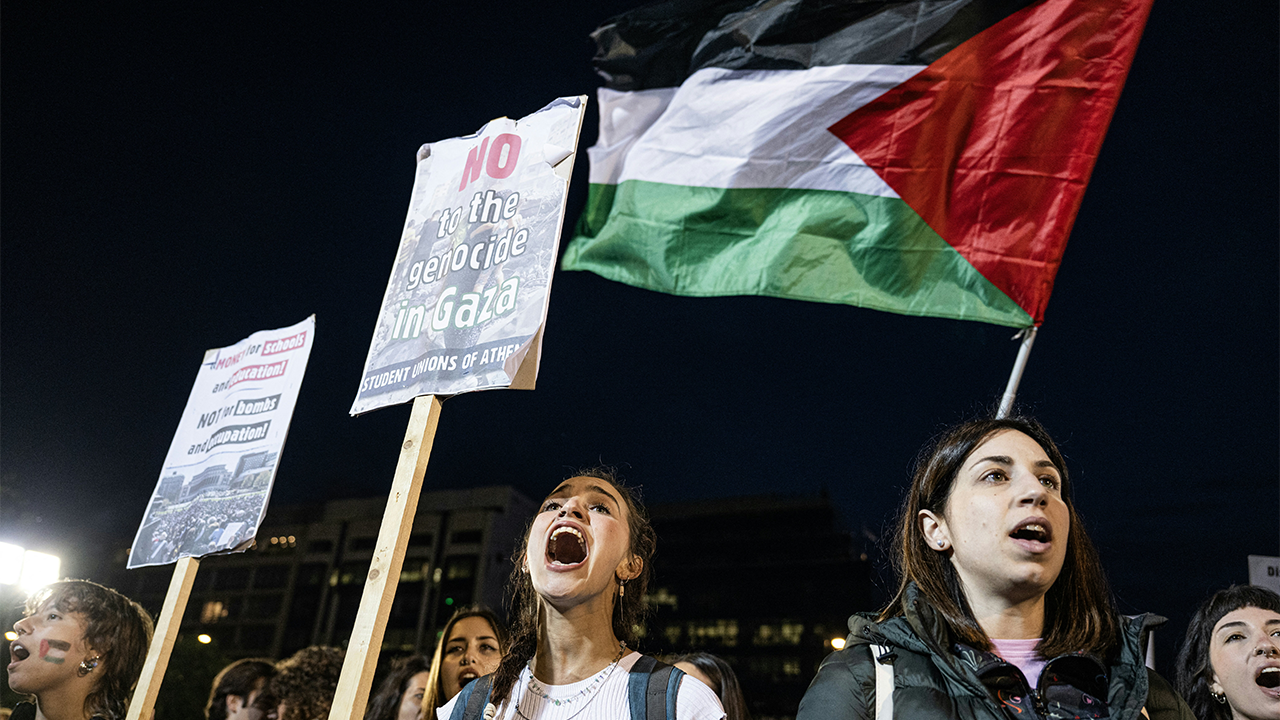The alleys are cast in permanent semidarkness, covered by black nylon tarpaulins to hide the Palestinian fighters there from Israeli drones overhead. Green Hamas flags and banners commemorating “martyrs” hang from the buildings, many badly damaged during Israeli raids and airstrikes to try to tamp down a growing militancy in the territory, fueled by the war in Gaza.
This is not Gaza or a traditional Hamas stronghold. It is a refugee camp in Tulkarm, a town in the Israeli-occupied West Bank, where the relatively moderate Palestinian faction of Fatah had long held sway.
I recently met a local commander of these young militants, Muhammad Jaber, 25, in one of those dusty, shattered alleyways. One of Israel’s most wanted men, he and other fighters like him say they have switched allegiances from the relatively moderate Fatah faction, which dominates the Israeli-occupied West Bank, to more radical groups like Hamas and Palestinian Islamic Jihad since the Hamas-led attack on Israel on Oct. 7.
Asked what lesson he had taken from the war in Gaza, Mr. Jaber paused for a moment to think.
“Patience,” he said. “And strength. And courage.”
Refugee camps in the northern West Bank, like the one in Tulkarm, have been hotbeds of militancy for years, well before the war in Gaza, as fighters pushed back against ever-increasing Israeli settlement activity and the failure of the peace process to produce a Palestinian state. After Oct. 7, Hamas urged Palestinians to join its uprising against Israel, a call that seems to have been heeded by some in these camps.
Militants like Mr. Jaber want to push the Israelis out of the West Bank, which Israel occupied after the 1967 war, and some, like Hamas, want to push the Israelis out of the region entirely.
More weapons and explosives are being manufactured in the West Bank, according to both the fighters themselves and Israeli military officials. They say the Fatah-dominated Palestinian Authority, which runs parts of the West Bank, is losing ground to the more radical Palestinian factions, who are actively fighting Israel and gaining more support from Iran in the form of cash and weapons smuggled into the territory.
Fatah recognizes Israel’s right to exist and cooperates with its army. But some of the militants affiliated to Fatah, part of the Aqsa Martyrs Brigades crucial to the second intifada of the early 2000s, have never respected the Palestinian Authority and its compromises with Israel and the occupation. Some have, like Mr. Jaber, simply declared their new allegiance to the more hard-line Islamist factions.
Mr. Jaber, widely known by his nom de guerre, Abu Shujaa, meaning Father of the Brave, commands the local branch of Islamic Jihad, which dominates the Tulkarm camp. He also leads a collective of all the militant factions in that area, including the Aqsa Martyrs Brigade there, which is known as the Khatiba. He switched from Fatah, he said, because it was Islamic Jihad and Hamas who were taking the fight to Israel to end the occupation and create Palestine by force of arms.
Mr. Jaber gained a kind of cult status in the spring when the Israeli military announced that it had killed him during a raid on the Tulkarm camp. Three days later, he emerged alive at the funeral of other Palestinians killed during that same raid, to joyous shouts from camp residents.
We met in an alley with streets stripped to sand by Israeli bulldozers, before ducking into a storefront to avoid being sighted by drones. Thin and bearded, wearing a black Hugo Boss T-shirt and a Sig Sauer pistol on his hip, Mr. Jaber was watched by six bodyguards. Some were armed with M16 and M4 rifles with full magazines and optical sights.
The day was blisteringly hot, dust coating everything, laying in layers on the leaves of the few trees. The area has been heavily damaged by Israeli drone strikes and armored bulldozers, which have ripped up many miles of paving in what the military said was an effort to uncover roadside bombs and other explosives.
The atmosphere was suffocating, mixed with wariness as spotters and bodyguards searched for undercover Israeli soldiers, who sometimes arrive dressed as city workers, garbage collectors or vendors pushing carts with fruit and vegetables.
Even before Oct. 7, Israel was battling the growing threat of Palestinian militants like Mr. Jaber in refugee camps in the northern West Bank towns and cities, such as Tulkarm, Jenin and Nablus. Militant groups were establishing footholds in the camps, which were originally set up for refugees from the 1948-49 Arab-Israeli war but later became impoverished urban settlements.
In the months preceding the Gaza war, Israeli troops were raiding the West Bank camps to root out weapons, find explosives factories and arrest or kill leaders like Mr. Jaber. There was a major Israeli incursion into Jenin almost a year ago, among other operations.
The Palestinian Authority and police no longer control these refugee camps, where the militants threaten to shoot officers if they try to enter, according to the militants, Israeli military officials and Palestinian officials, including the governor of Jenin, Kamal Abu al-Rub.
The Israeli actions aim to combat what one senior Israeli military officer called the terrorist infrastructure — command centers, explosives labs and underground facilities — that militants were trying to establish there with the help of Iranian money and weapons.
In the last two years, the West Bank camps have become safe havens, the officer noted, because the Palestinian Authority did not operate there anymore. The officer requested anonymity in accordance with Israeli military ground rules.
When the Israeli military attacks Tulkarm or Jenin, residents say, the Palestinian Authority security forces stay in their barracks in the city centers and do not confront them.
Though Mr. Jaber insisted he had no war with the Palestinian Authority, he condemned those “who have guns and stand in front of Israel and do nothing.”
“Liberation of our lands is our religion,” he said. “This is not my conflict but the people’s conflict, a war for land, freedom and dignity.”
On Sunday, an Israeli drone strike on a house in the camp killed a relative, Saeed Jaber, 25, a wanted militant who had also moved from Fatah to Islamic Jihad.
Mr. Abu al-Rub, the governor, does not deny that the authority’s security forces stay out of the refugee camps, but he blames Israel. “If Israel does not come, there are no problems,” he said. “Israel is constantly working to create divisions among us, because if they kill the people they can take the land.” It is Israel, he said, “that causes chaos, that enters our refugee camps for no reason, killing our youth, to weaken the P.A. and ensure people lose respect for their government.”
In the alleys of another impoverished Tulkarm refugee camp, a young man appeared, dressed in modish black with logos from North Face and Under Armour. Aged 18, he said he had been wounded several times and would only identify himself as Qutaybah, his nom de guerre, honoring an Arab general from more than 1,000 years ago. He belongs to Hamas, which dominates his camp.
Qutaybah has a long scar down his left arm, another on his abdomen, and he wore a black patch over his left eye, which he said he lost to a drone strike on Dec. 19. He said his earlier wounds came in May 2023 when Israeli soldiers dressed as city workers entered the camp.
He said that he was badly wounded in that raid, during which two others were killed. His relatives later corroborated his story, but it could not be confirmed directly with the Israeli authorities.
Qutaybah carried an M16 with an optical sight, one of two weapons he said he had stolen during an attack in May on Bat Hefer, an Israeli village abutting the West Bank. That attack shook many Israelis and seemed to render a calm part of Israel less safe, foreshadowing further military moves to counter the Palestinian fighters.
“No one comes to you and tells you to join the resistance,” Qutaybah said. “What is there for us here anyway? We live in a prison.”
He and his friends have learned some lessons from Gaza, he added.
“We see the Israelis killing our innocent women and children. Their plan is to carry out a genocide here next,” he said. Gaza will at least “encourage more in the West Bank to resist.”
Qutaybah rubbed his black sneaker over broken pavement in the alley.
“There is a bomb under here,” he said. “When the Israelis come.”
The bodyguards and fighters posted to the camp’s entrances work in shifts. They carry walkie-talkies to warn of Israeli raids and of any stranger who would risk wandering in.
Most of those fighters, like Hassan, 35, have been in Israeli jails. Hassan has three daughters but did not want to discuss them or their future or his family name, just his mission.
“Every entrance is blocked and watched,” he said. “The Israelis can come in any time.”
Also in the alley was Ayham Sroudji, 15, who was born in the refugee camp. He is not a member of any militant group and says he’s good at school, when it isn’t canceled because of violence.
Did he want to become a teacher and help his people that way? “Become a teacher?” he answered. “There is no such thing here. What did I see in my life but Israeli soldiers invading my camp?”
Asked about his dreams, he said: “I want to see a beach. I’ve never seen a beach in my life.”
Beside him was Ahmed, 17, carrying an M4 rifle. “Is there no one who doesn’t want to see the beach, the land they took from us?” Ahmed said.
“I dream to see Jerusalem liberated,” Ayham added. “Israelis are living in and enjoying our land, and we want to force them out of what they stole.”
Then he pointed around him, to the dust, the rubble, the guns.
“Look what we wake up to,” he said. “Do you even see a sidewalk? Sometimes I dream of a smooth pavement and a sidewalk.”
Rami Nazzal contributed reporting from Tulkarm and Jenin, and Natan Odenheimer from Jerusalem.






